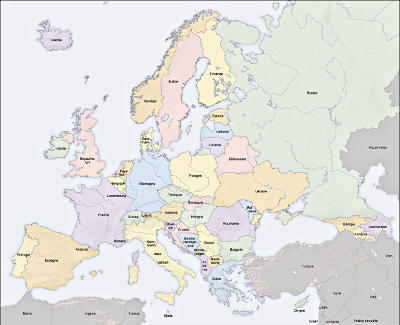 Le 31-03-2019 par H. Robertson
-
Le 31-03-2019 par H. Robertson
- 

What about the Franco-German Treaty of Aix-la-Chapelle?
This treaty has drawn relatively little public attention in this country, except for comments in the press saying that it expresses the desire of France and Germany to show an example of unity at the heart of the European Union. When the treaty is investigated, however, we can detect provisions which are disquieting, both for UK and Europe, and for French and German people themselves. My information comes from French friends of mine.
The preamble to the treaty shows commitment to the idea of the sovereign nature of the European Union.
Articles 1 and 2 declare that France and Germany will co-operate to promote economic, fiscal and social convergence, and that they agree to consult each other regularly before major European deadlines, in order to establish common positions.
Article 3 says that they will deepen their cooperation on foreign policy, defence and security. This treaty has its precedent in the Elysée Treaty, the original Franco-German treaty of co-operation, signed by President de Gaulle and Chancellor Adenauer (of West Germany) on
22nd January 1963 [2], exactly fifty-six years before. The Elysée Treaty was renewed by Mitterand and Kohl in
1989 [3], and Chirac and Kohl in
1996 [4].
The present treaty, however, goes much further.
Article 4 of the 2019 treaty, regarding defence, proposes further strengthening of military co-operation, common defence programmes, and the establishment of a Franco-German Defence and Security Council as a political body to manage these commitments.
Macron's aim is to create a Franco-German army. In fact, according to a protocol added to the 1963 treaty by Mitterand and Kohl in 1989, just before German re-unification, a Franco-German Council of Defence and Security was created at that time, and was to include the two heads of state, as well as foreign ministers and army chiefs of both countries,
and even proposed the combining of nuclear, as well as conventional, forces [This protocol is to be found in presidential decree
No. 89-319, 17th May 1989, published by the French Ministry of Foreign Affairs in the Journal officiel de la République française].
It also contravenes the Treaty on
the Final Settlement with Respect to Germany, the ‘2-4 Treaty' [6], signed in Moscow on 12th September 1990, just before German re-unification, by West Germany and East Germany on the one hand, and the WW2 allies, France, UK, USA and USSR on the other. Article 3 of the 1990 treaty limits Germany's military strength and denies Germany possession and control of nuclear weapons.
Article 5 of the present Aix-la-Chapelle Treaty (2019) proposes co-operation between French and German diplomatic and consular missions, with particular emphasis on their representation at UN.
Article 8 elaborates on this, stating that France and Germany will combine to demand a restructuring of the UN Security Council and that Germany become a permanent member of the Security Council.
Articles 13 and 14 of the Aix-la-Chapelle Treaty, which refer to cross-border co-operation, propose the creation of Euro-districts which can effectively combine French and German border areas in single administrative units [Alsace in France and Baden-Württemberg in Germany have been suggested as a possible example]. A cross-border co-operation committee will be created to manage this. This also contravenes the Moscow treaty of 1990, Article 1, which stipulates that re-unified Germany has definitive borders and will make no territorial claims on other countries.
Articles 23, 24 and 25, deal with political integration. The French and German governments will hold bilateral meetings at least once a year. A Franco-German Council of Ministers will monitor the progress of co-operation. A member of either government, France and Germany, will take part, at least every three months, in the council of ministers of the other country. The council, structures and instruments of Franco-German co-operation will be reviewed regularly, starting within six months of the treaty being signed. The respective parliaments and the Franco-German Council of Ministers will be informed of the progress of co-operation.
In fact, a combined resolution was made last year, on
22nd January 2018 [7], the fifty-fifth anniversary of the Elysée Treaty, by the French Assembly and the German Bundestag, providing for the creation of a Franco-German parliamentary assembly, including 50 deputies of the French Assembly and 50 members of the German Bundestag, which should meet twice a year, alternately in France and Germany. Their task is to review all means of co-operation or integration between the two countries, and discuss all matters concerning France and Germany, regarding both their internal situation, as well as their relations with other countries. This agreement is called the Projet d'Accord parlementaire franco-allemande (
Entwurf Deutsch-Französisches Parlamentsabkommen [8]). The first meeting of this combined parliament is due to take place in a few days' time, on 25th March, in Paris.
Many people in France fear the loss of sovereignty involved in these Franco-German accords, the blurring of national borders, the interference in the internal affairs of their country, and the sharing of military, including nuclear, capability. They say that Macron is sacrificing France's independence for the sake of his ambitions in the European theatre. They say, Bienvenue dans la République Fédérative de Germanie ! ‘Welcome to the Federative Republic of Germanie !'
Britain, whether in the European Union, or out of it, is still a geographical part of the European continent, and has a responsibility to ensure that no nation or partnership of nations has hegemony of power in Europe. The dangerous direction that the European Union is now taking becomes obvious.
Mr Hamish Robertson (From Scotland).
FOOTNOTES.
Lien permanent
Partager : 


 Le 31-03-2019 par H. Robertson
-
Le 31-03-2019 par H. Robertson
- 

![]()
![]()


